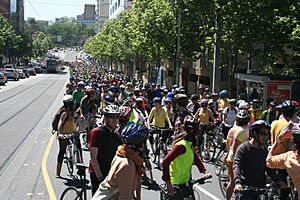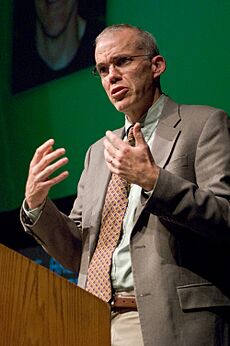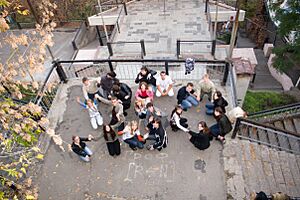350.org facts for kids
 |
|
| Formation | 2007 |
|---|---|
| Type | NGO |
| Purpose | cut CO2 emissions and build a global movement for climate solutions |
| Headquarters | Boston, Massachusetts |
|
Founders
|
Bill McKibben, Phil Aroneanu, Will Bates, Kelly Blynn, May Boeve, Jamie Henn and Jon Warnow |
| Award(s) | Right Livelihood Award |
350.org is a worldwide group that works to solve the climate crisis. Their main goal is to stop using fossil fuels (like coal, oil, and gas). They want the world to switch to renewable energy (like solar and wind power). They do this by building a big movement of people who care about the planet.
The number 350 in their name stands for 350 parts per million (ppm) of carbon dioxide (CO2). Scientists say 350 ppm is a safe limit for CO2 in the air. If we go higher, it could lead to a dangerous climate tipping point. By the end of 2007, when 350.org started, CO2 levels were already too high. In July 2022, the level reached 421 ppm. This is 50% higher than before factories and cars became common.
350.org uses online campaigns and organizes many public events. They work with many other groups. They have brought together thousands of volunteers in over 188 countries. They helped organize the Global Climate Strike in September 2019. This strike grew from the Fridays for Future movement, started by young people.
Contents
Fighting Climate Change
350.org runs many different campaigns. These campaigns happen in local areas and all over the world.
Stopping Fossil Fuel Investments
The "Fossil Free" campaign asks groups to stop investing money in fossil fuel companies. This idea comes from past movements, like the one that helped end apartheid in South Africa. From 2012 to October 2021, over 1,500 organizations agreed to stop investing in fossil fuels. These groups controlled more than US$40 trillion.
350.org says it's wrong to make money from something that harms the climate. They want groups to stop new investments in fossil fuel companies right away. They also want them to sell off any current investments in these companies.
This campaign started with colleges and universities in the United States. Now, it includes cities like New York, big banks in Japan, and religious groups. Many countries around the world have active campaigns to stop fossil fuel investments.
Stopping the Keystone XL Pipeline
350.org saw the Keystone XL pipeline as a very important issue. They believed it was a key moment for the environmental movement. This pipeline was planned to carry oil from Canada to the United States.
A NASA climate scientist named James Hansen said the Keystone XL pipeline would be "game over" for the planet. He warned that the oil in Canadian bitumen sands was like a "carbon bomb."
350.org worried about oil spills along the pipeline's path. The pipeline would pass near the Carrizo-Wilcox Aquifer in Texas. This aquifer provides drinking water for over 12 million people. It could also threaten the Ogallala Aquifer. This is the largest aquifer in North America. It supplies water for millions of people and farms.
People who supported the pipeline said it would create many jobs. But 350.org argued that it would only create a few thousand temporary jobs during building. The U.S. State Department thought it would create only 35 permanent jobs. The Natural Resources Defense Council (NRDC) also said the pipeline would raise gas prices, not lower them. The NRDC also said the pipeline would not help the U.S. become energy independent. This is because the oil would be sent to Texas to be sold to other countries.
Thanks to 350.org and other groups, President Barack Obama stopped the Keystone XL pipeline on November 6, 2015. This ended a seven-year review. Bill McKibben said this was the first time a world leader stopped a project because of its climate impact.
Later, on January 24, 2017, President Donald Trump tried to restart the pipeline. But on January 20, 2021, President Joe Biden canceled the permit on his first day in office. The project was finally stopped by the company TC Energy on June 9, 2021. The Wall Street Journal newspaper said 350.org played a big part in the project's failure.
Stopping the Mountain Valley Pipeline
On January 31, 2024, 350.org joined with GreenFaith to protest the Mountain Valley Pipeline. This pipeline would carry gas and methane over 300 miles from West Virginia to Southern Virginia. They also opposed its 31-mile Southgate Extension.
Local Fossil Fuel Bans
Many local areas around the world have passed laws to limit or ban fossil fuel production. For example, 410 cities in Brazil have banned fracking. Two states in Brazil, Santa Catarina and Paraná, also have bans.
Global Actions
350.org organizes large events to raise awareness about climate change.
International Day of Climate Action

On October 24, 2009, 350.org organized an "International Day of Climate Action." This event aimed to influence leaders going to the UN Climate Change meeting in December 2009. This was the first global campaign based on a scientific number.
People organized many actions. They made giant pictures of the number "350." They held walks, marches, and rallies. There were also educational talks, bike rides, and singing events. People planted trees and had carbon-free dinners. In the Maldives, leaders even held an underwater cabinet meeting! The group reported that 5,245 actions took place in 181 countries.
Global Work Party
Following the 2009 event, 350.org worked with the 10:10 Climate Campaign. They organized another global day of action on October 10, 2010. This campaign focused on local actions to fight climate change. People planted trees, installed solar panels, and switched to cleaner electricity. These actions happened in almost every country.
Connect the Dots
In 2012, 350.org continued its efforts with "Connect the Dots" rallies on May 5. These rallies aimed to show how climate change is linked to extreme weather. 350.org called this day "Climate Impacts Day."
Global Power Shift
In June 2013, 350.org held a "Global Power Shift" meeting in Istanbul, Turkey. About 500 climate organizers from 135 countries attended. They shared ideas and learned how to organize movements. They also planned events in their home countries. The goal was to build stronger connections and work together globally.
Summer Heat Campaign
In the summer of 2013, 350.org launched the "Summer Heat" campaign. This involved many large protests across the USA. Actions took place in eleven different locations. People from local groups, labor unions, farms, and environmental justice groups joined in. Their slogan was: As The Temperature Rises, So Do We.
People's Climate March
350.org helped organize the People's Climate March on September 21, 2014. Over 2,000 events happened around the world.
Global Climate Strike
350.org was a main organizer of the Global Climate Strike from September 20–27, 2019. Strikes were planned in over 150 countries. Many groups, unions, and social movements supported these strikes. They were inspired by the school strikes of the Fridays for Future movement.
The goal of the Global Climate Strike was to highlight the urgent climate crisis. It aimed to put pressure on politicians, the media, and the fossil fuel industry. These strikes were meant to start a continuous movement of people.
More than 7.6 million people in 185 countries took part. This made the Global Climate Strike the largest climate protest in history.
Other Activities
Besides big events, 350.org does ongoing work. They plant trees (350 trees at a time) to help remove carbon from the air. They promote the term "350" and publish ads in newspapers. They also teach young leaders and talk to governments about carbon targets. They joined a campaign to create a ".eco" internet address. In 2009, they asked the U.S. Environmental Protection Agency to set limits for greenhouse gases. They wanted the agency to cap carbon dioxide at 350 parts per million. The group also made a video showing the Mendenhall Glacier in Alaska shrinking. This video clearly showed the effects of a warming climate.
Creative Works
350.org uses creative ways to share its message.
Do The Math Movie
The Do The Math movie is a 42-minute film. It is about the growing movement to change the scary numbers of the climate crisis. It also challenges the fossil fuel industry. The film talks about three numbers. To keep global warming below 2 degrees Celsius, we can only release 565 more gigatons of carbon dioxide. But fossil fuel companies have 2,795 gigatons of carbon in their reserves. This is five times more than the safe limit. Scientists like James Hansen say 2 degrees of warming is already dangerous.
"Rise: From One Island to Another" Poem
"Rise: From One Island to Another" is a poem and video project. It shows how rising sea levels affect islands. It also shows how the climate crisis connects different countries. The poem was written by two islanders. Kathy Jetn̄il-Kijiner is from the Marshall Islands. Aka Niviâna is from Greenland. Their poetry connects their experiences of melting glaciers and rising seas.
Bill McKibben, a founder of 350.org, says science alone cannot make change. He believes we also need emotions and creativity. He suggests more poetry, music, and stories to help people understand the climate crisis. The "Rise" film project was created in 2018.
How 350.org Started

350.org was started by American environmentalist Bill McKibben. He worked with a group of students from Middlebury College in Vermont. In 2007, their "Step It Up" campaign held 1,400 protests across the United States. McKibben believes these actions helped Hillary Clinton and Barack Obama change their energy plans during the 2008 presidential campaign. In 2008, 350.org grew from the "Step It Up" campaign into a global organization.
Bill McKibben is a writer who wrote one of the first books for the public about global warming. He often writes about climate change and alternative energy. As of 2022, McKibben is a senior advisor to 350.org. May Boeve is the Executive Director.
Rajendra Pachauri, a top climate scientist from the Intergovernmental Panel on Climate Change (IPCC), supports reducing carbon dioxide to 350 ppm. McKibben called this support "amazing." Some media said Pachauri's support was a big win for 350.org's work.
350.org gained more attention after Bill McKibben appeared on The Colbert Report TV show in August 2009. McKibben promotes the group by giving talks and writing articles for major newspapers. In 2012, 350.org received the Katerva Award for changing behavior.
The Science Behind 350
NASA climate scientist James Hansen believes that any amount of CO2 above 350 parts per million (ppm) is unsafe. In 2009, Hansen said that to keep our planet similar to how it has been, CO2 needs to be reduced to 350 ppm or less. Carbon dioxide, the main greenhouse gas, keeps rising. In May 2013, scientists measured over 400 ppm of CO2 in the atmosphere. This was likely the first time in over 3 million years. In May 2019, it crossed 415 ppm, and it continues to increase.
In 2009, the Copenhagen Accord set a limit of 2°C (3.6°F) for global temperature rise. In the 2015 Paris Agreement, a new limit of 1.5°C (2.7°F) was set. This is because even a small difference in temperature can have big impacts, especially for areas easily affected by climate change. A 2018 report by the Intergovernmental Panel on Climate Change (IPCC) urged action to limit warming to 1.5°C.
Scientists estimate that to stay below a 2°C increase, humans can only release about 565 more gigatons of carbon dioxide into the air. However, fossil fuel companies have about 2,795 gigatons of carbon in their reserves. This is five times more than the safe limit.
Who is Part of 350.org?
350.org says it works with 300 organizations around the world. Many famous people support the group or its goals. These include Archbishop Desmond Tutu, Alex Steffen, Bianca Jagger, David Suzuki, and Colin Beavan.
In 2011, another group called 1Sky joined with 350.org.
See also
 In Spanish: 350.org para niños
In Spanish: 350.org para niños
- Air pollution reduction efforts
- Climate change mitigation
- Environmental movement
- Individual and political action on climate change
- List of environmental issues
- Politics of global warming
 | Calvin Brent |
 | Walter T. Bailey |
 | Martha Cassell Thompson |
 | Alberta Jeannette Cassell |



